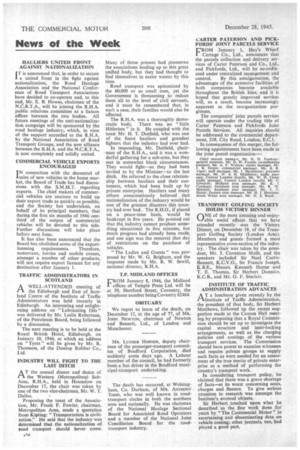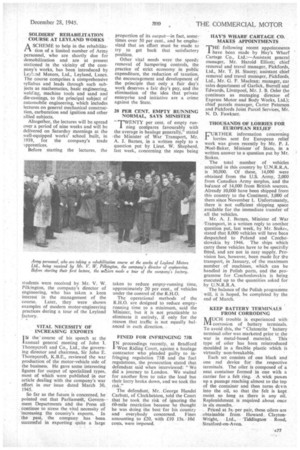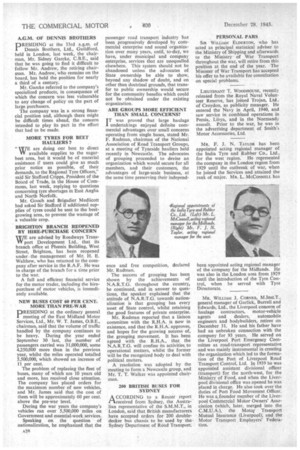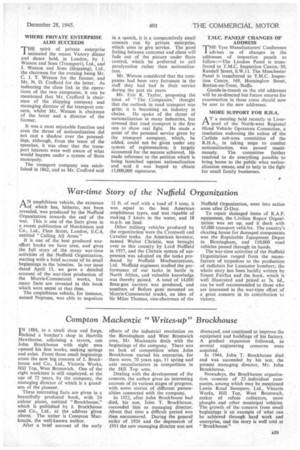News of the Week
Page 28

Page 29

Page 30

Page 31

If you've noticed an error in this article please click here to report it so we can fix it.
HAULIERS UNITED FRONT AGAINST NATIONALIZATION
IT is announced that, in order to secure I a united front in the fight against nationalization, the Road Haulage Association and the National Conference of Road Transport Associations have decided to co-operate and, to this end, Mr. E. B. Howes; chairman of the N.C.R.T.A., will be joining the R.H.A.
• public relations committee as a liaison officer between the two bodies. All • future meetings of the anti-nationalization campaign will be sponsored by the road haulage industry, which, in view of the support accorded to the R.H.A. by the National Association of Road Transport Groups, and the new alliance between the R.H.A. and the N.C.R.T.A., is now completely and solidly united.
COMMERCIAL VEHICLE EXPORTS ENCOURAGED
IN connection with the decontrol of sales of new vehicles in the home market, the Board of Trade has had discussions with the S.M.M.T. regarding exports. The chief makers of commercial vehicles are anxious to build up their export trade as quickly as possible, and the Society has undertaken, on behalf of its principal members, that during the first six months of 1946 onethird of the output of commercial vehicles will be devoted to this side. Further discussions will take place before next June.
It has also been announced that the Board has abolished some of the exportlicensing requirements. Therefore, motorvans, lorries and mobile cranes, amongst a number of other products, will not require export licences for any destination after January 1.
TRAFFIC ADMINISTRATORS IN SCOTLAND
AWELL-ATTENDED meeting of the Edinburgh and East of Scotland Centre of the Institute of Traffic Administrators was held recently in Edinburgh. An interesting and enlightening address on "Lubricating Oils" was delivered by Mr. Leslie Robertson, of the Petroleum Board, being followed by a discussion.
The next meeting is to be held at the Royal British Hotel, Edinburgh, on January 10, 1946, at which an address on " Tyres " will be given by Mr. R. Thomson, of the Dunlop Rubber Co., Ltd.
INDUSTRY WILL FIGHT TO THE LAST DITCH
AT the annual dinner and dance of the Western (Metropolitan) SubArea, R.H.A., held in Hounslow on December 17, the chair was taken by one of the two vice-chairmen, Mr. W. T.
Proposing the toast of the Association, Mr. Frank F. Fowler, chairman, Metropolitan Area, made a quotation from Kipling: "Transportation is civilization." He said that the industry was determined that the nationalization of road transport should hever come. Many of those present had pioneereu the associations leading up to this great unified body, but they had thought to find themselves in easier waters by this time.
Road transport was epitomized by the 60,000 or so small men, yet the Government is threatening to reduce them all to the level of civil servants, and it must be remembered that, in such a case, their families would also be affected.
The R.H.A. was a thoroughly democratic body. There was no "little Hitlerism in it. He coupled with the toast Mr. H. T. Outfield, who was one of the finest hauliers and grandest fighters that the industry had ever had.
In responding, Mr. Outfield, chair-man of the R.H.A., said it was a wonderful gathering for a sub-area, but they met in somewhat black circumstances. They would fight—as they had been invited to by the Minister—to the last ditch. He referred to the close relationship between hauliers and their customers, which had been built up by private enterprise. Hauliers and many others conscientiously believed that nationalization of the industry would be one of the greatest disasters this country had ever had. The R.H.O., if placed on a peace-time basis, would be bankrupt in five years. He pointed out that the industry cannot produce something sensational in five minutes, but much progress had already been made, and one sign was the removal that day of restrictions on the purchase of vehicles.
"The Ladies and Guests" was proposed by Mr. W. G. Brigham, and the response made by Mr. R. W. Sewill, national director, R.H.A.
T.P. MIDLAND OFFICES
FROM January 8, 1946, the Midland offices of Temple Press Ltd. will be at 50, Hertford Street, Coventry, the telephone number being Coventry 62464.
CARTER PATERSON AND PICKFORDS' JOINT PARCELS SERVICE
CROM January 1, Hay's Wharf I. Cartage Co., Ltd., announces that the parcels collection and delivery services of Carter Paterson and Co., Ltd., and Pickfords, Ltd., will be co-ordin ated under centralized management and
control. By this amalgamation, the advantages of the extensive facilities of both companies . become available throughout the British Isles, and it is hoped that greatly improved services will, as a result, become increasingly apparent as the reorganization progresses.
The companies' joint parcels services will operate under the trading title of Carter Paterson and Pick.fords Joint Parcels Services. All inquiries should be addressed to the commercial department, 238, City Road, London, E.C.1.In consequence of this merger, the following appointments have been made in the joint parcel organization:—
Chief parcels manag-r, Mr. N. D. Fawknert general assistant, Mr. D. H. Foulds; co-ordinating assistant. Mr. A. F. Walton; claims manager, Mr. Green; commercial manager, Mr. S. R.
Vigor; stall manager, Mt. Macalaster; accounts ntanager, Mr. W. S. H. Middleton; traffic manager, Central London (north), Mr. W. H. Cross; traffic manager, Central London (south), Mr. C. Edwards; Midland area manager. Mr. E. J. Coxhead; Northern area manager, Mr R. W Mitchell: Southern area manager. Mr. J. V. Hatch; Eastern area manager, Mr. H, J. Harrison: South Wales area manager, Mr. H. S. Reed.
TRANSPORT GOLFING SOCIETY HOLDS VICTORY DINNER
ONE of the most amusing and enjoyable social affairs that we have attended recently ,was the Victory Dinner, on December 18, of the Transport Golfing Society (London Area). Members and guests formed a most representative cross-section of the industry. The chair was taken by the president, Mr. J. Coventon Moth, and the speakers included Sir Noel CurtisBennett, K.C.V.O., Sir Francis Joseph, K.B.E., Messrs. Kenneth Horne and T. E. Thomas, Sir Herbert Minnie°, K.C.B., and Mr. G. F. Sinclair.
INSTITUTE OF TRAFFIC ADMINISTRATION ADVANCES
AT a luncheon given recently by the Institute of Traffic Administration,
the president of that body, Sir Herbert Matthews, followed up the recent suggestion made at the Caxton Hall meeting by proposing that a Royal Commission should be set up to investigate the capital structure and inter-locking arrangements, as well as the charging policies and coatings of the various transport services. The Commission should have power to examine witnesses and require private groups to supply such facts as were needed for an assessment of the true merits of private enterprise as a method of performing the country's transport work. In considering transport policy, he claimed that there was a grave shortage of facts—at its worst concerning costs, charges and finance. To give serious attention to research was amongst the
• Instifilte's. avowed objects, Sir Herbert touched upon what he described as the fine work done for years by "The Commercial Motor" in ascertaining and disseminating data on vehicle costing; other journals, too, had played a good part.
SOLDIERS' REHABILITATION COURSE AT LEYLAND WORKS "
ASCHEME to help in the rehabilitation of a limited number of Army personnel, who are shortly due for demobilization and are at present stationed in the vicinity of the company's works, has been introduced by Leyland Motors, Ltd., Leyland, Lancs. The course comprises a comprehensive syllabus and leads through such subjects as mathematics, basic engineering, weld:ng, machine tools and sand and die-castings, to the principal subject of automobile engineering, which includes lectures on general mechanical construction, carburation and ignition and other allied subjects.
Altogether, the lectures will be spread over a period of nine weeks and will be delivered on Saturday mornings at the well-equipped works' school built, in 1939, for the company's trade tpprentices.
Before starting the lectures, the students were received by Mr. V. W. Pilkington, the company's director of engineering, who has taken a keen interest in the management of the course. Later, they were shown examples of modern motor-engineering practices during a tour of the Leyland factory.
VITAL NECESSITY OF INCREASING EXPORTS
TV thecourse of his speech at the 'annual general meeting of John 1. Thornycroft and Co., Ltd., the governing director and chairman, Sir John E. Thornycroft, K.B.E., reviewed the war production of the motor-vehicle side of the business. He gave some interesting figures for output of specialized types, most of which were published in our article dealing with the company's war effort in our issue dated March 30, 1945.
So far as the future is concerned, he pointed out that Parliament, Government Departments and the Press all continue to stress the vital necessity of increasing the country's exports. In the past, the company has been successful in exporting quite a large proportion of its output—in fact, sometimes over 50 per cent., and he emphasized that an effort must be made to try to get back that satisfactory position.
Other vital needs were the speedy removal of hampering controls, the practice of strict economy in public expenditure, the reduction of taxation, the encouragement and development of the principle that only a fair day's work deserves a fair day's pay, and the elimination of the idea that private enterprise and initiative are a crime against the State.
20 PER CENT. EMPTY RUNNING NORMAL, SAYS MINISTER
"TWENTY per cent. of empty run1 fling compares favourably with the average in haulage generally," stated ,the Minister of War Transport, Mr. A. J. Barnes, in a written reply to a question put by Lieut. W. Shepherd, last week, concerning the steps being
taken to reduce empty-running time, approximately 20 per cent., of vehicles under the control of the R.H.O.
The operational methods of the R.H.O. are designed to reduce emptyrunning time to a minimum, said the Minister, but it is not practicable to eliminate it entirely, if only for the reason that traffic is not equally balanced in each direction.
FINED FOR INFRINGING 73B TN proceedings recently, at Bradford 'Vest Riding Court, against a haulage contractor who pleaded guilty to infringing regulation 73B and the fuel regulations, the prosecution stated that defendant said when interviewed: "We did a journey to London. We waited for another firm to take the load but their lorry broke down, and we took the risk."
The defendant, Mr. , George Handel Carbutt, of Cleckheaton, told the Court that he took the risk of ignoring the 60-mile restriction because he thought he was doing the best for his country and everybody concerned. Fines amounting to £20, with £10 I5s. 10d costs, were imposed. HAY'S WHARF CARTAGE CO, MAKES APPOINTMENTS
THE following recent appointments have been made by Hay's Wharf Cartage Co., Ltd.:—Assistant general manager, Mr. Harold Elliott; chief removal and travel manager, Pickfords, Ltd., Mr. T. H. Stacey; assistant chief removal and travel manager, Pickfords. Ltd., Mr. G. F. Maclean; manager, ear sales department of Garlick, Burrell and Edwards, Liverpool, Mr. J. B. Osier (he continues as managing director of Exprass Motor and Body Works, Ltd.); chief parcels manager, Carter Paterson and Pickfords Joint Parcel Services, Mr. N. D. Fawkner.
THOUSANDS OF LORRIES FOR EUROPEAN RELIEF
FURTHER information concerning lorries sent for European relief work was given recently by Mr. P. J. Noel-Baker, Minister ' of State, in a written answer to a question put by Mr. Stokes.
The total number of vehicles acquired in this country by U.N.R.R.A. is 30,000. Of these, 14,000 were obtained from the U.S. Army, 2,000 from Canadian -Army surplus, and the bdance of 14,000 from British sources. Already 10,000 have been shipped from this country to the Continent, 3,000 of them since November 1. Unfortunately, there is not sufficient shipping space available for the immediate transfer of all the vehicles.
Mr. A. J. Barnes, Minister of War Transport, in a written reply to another question put, last week, by Mr. Stolcc., stated that 8,000 vehicles will have been despatched to Poland and Czechoslo+akia by 1946. The ships which carry these vehicles have to be specially fitted, and are not in easy supply. Provision has, however, been made fcr the transport, in January, of the maximum number of machines, which can be handled in Polish ports, and the programme for Czechoslovakia is being executed up to the quantities asked for by U.N.R.R.A.
The balance of the Polish programme will, it is hoped, be completed by the end of March.
KEEP BATTERY TERMINALS FROM CORRODING 1UUCH. trouble is experienced with IYI corrosion of battery terminals. To avoid this, the " Clatonrite ' battery terminal oiler was marketed prior tc the war in metal-based material. This type of oiler has been reintroduced moulded in a flexible plastic which is virtually non-breakable.
Each set consists of one black and one red device for the respective terminals. The oiler is composed of a neat container formed in one with a carrier for a felt ring. A wick pa&es up a passage reaching almost to the top of the container and then turns dcvm into the oil, so that the felt is kept moist so long as there is any oil. Replenishment is required about once in six months.
Priced at 5s. per pair, these oilers are obtainable from Howard-. ClaytonWright, Ltd., Tiddington Road, Stratford-on-Avon. A.G.M. OF DENNIS BROTHERS DRESIDING at the 33rd a.g.m. of Dennis Brothers, Ltd., Guildford, held in London, last week, the chairman, Mr. Sidney Garcke, C.B.E., said that he was going to find it difficult to follow Mr. Andrew, the retiring chairman. Mr. Andrew, who remains on the board, has held the position for nearly a third of a century.
Mr. Garcke referred to the company's specialized products, in consequence of which the concern was less vulnerable to any change of policy on the part of large purchasers.
The company was in a strong financial position and, although there might be difficult times ahead, the concern intended to play its part in the effort that had to be made.
MORE TYRES FOR BEET HAULIERS?
" VUE are doing our best to direct VV. available supplies to the sugarbeet area, but it would be of material assistance if users could give as much prior notice as possible, of their demands, to the Regional Tyre Officers," said Sir Stafford Cripps, President of the Board of Trade, in the House of Commons, last week, replying to questions concerning tyre shortages in East Anglia and North Norfolk, Mr. Gooch and Brigadier Medlicott had asked Sir Stafford if additional supplies of tyres could be sent to the beetgrowing area, to prevent the wastage of a valuable crop.
BRIGHTON BRANCH REOPENED BY HIRE-PURCHASE CONCERN
Ware advised by Roadways Transilrt Development Ltd., that its branch office at Phoenix Building, West Street, Brighton, has been reopened under. the management of Mr. H. E. Walthew, who has returned to the company after service in the R.A.F. He was in charge of the branch for a time prior to the war.
A full and efficient financial service for the motor trader, including the hirepurchase of motor vehicles, is immediately available.
NEW BUSES COST 60 PER CENT. MORE THAN PRE-WAR
PRESIDING at the ordinary general meeting of the East Midland Motor Services, Ltd., Mr. W. T. James, 0.B.E., chairman, said that the volume of traffic handled by the company continues to be heavy. During the year ended September 30 last, the number of passengers carried was 31,000,000, some 4,250,000 more than in the previous year, whilst the miles operated totalled 5,500,000, which showed an increase of 11 per cent.
The problem of replacing the fleet of buses, many of which are 10 years old and more, has received close attention. The company has placed orders for the maximum number of new vehicles, and Mr. James said that the cost of them will be approximately 60 per cent. above the pre-war level, During the war years the company's vehicles ran over 5,500,000 miles on Government and essential-work services.
Speaking on the question of nationalization, he emphasized that the passenger road transport industry has been progressively developed by commercial enterprise and sound organization over many years, until, to-day, we have, under municipal and company enterprise, services that are unequalled elsewhere. This system should not be abandoned unless the advocates of State ownership be able to show, beyond any shadow of doubt, and on other than doctrinal grounds, that transfer to public ownership would secure for the community benefits which could not be obtained under the existing organization.
ARE GROUPS MORE EFFICIENT THAN SMALL CONCERNS?
IT was proved that large haulage 1 undertakings enjoyed definite commercial advantages over small concerns operating from single bases, stated Mr. F. Rudman, chairman of the National Association of Road Transport Groups, at a meeting of Tyneside hauliers held recently in Newcastle. The advocates of grouping proceeded to devise an organization which would secure for all members, and their customers, the advantages of large-scale business, at the same time preserving their independ
ence and free competition, declared Mr. Rudman.
The success of grouping has been shown by the achievements of N.A.R.T.G. throughout the country, he continued, and in answer to questions, the speaker explained that the attitude of N.A.R.T.G. towards nationalization is that grouping has every asset of State control, whilst retaining the good features of private enterprise.
Mr. Rudman reported that a liaison committee with the R.H.A. is now in existence, and that the R.H.A. approves, and hopes for the growing success of, the grouping movement. It has been agreed with the R.H.A., that the N.A.R.T.G. will confine its activities to operational matters, whilst the former will be the recognized body to deal with political matters.
A resolution was adopted by the meeting to form a Newcastle group, and Mr. T. T. Walker was appointed chairman.
200 BRITISH BUSES FOR SYDNEY
A CCORDING to a Reuter report tAreceived from Sydney, the Australian representative of the S.M.M.T., in London, said that British manufacturers have accepted orders for 200 doubledecker bus chassis to be used by the. Sydney Department of Road Transport.
MR. WILLIAM J. CORNES, M.Inst.T., general manager of Garlick, Burrell and Edwards, Ltd., the Liverpool concern of haulage contractors, motor-vehicle agents and dealers, automobile engineers and bodybuilders, retires on December 31. Ile and his father have had an unbroken connection with the company for 93 years. He served on the Liverpool Port Emergency Committee as road-transport representative and was mainly instrumental in creating the organization which led to the formation of the Port of Liverpool Road Transport Control, Ltd. In 1939 he was appointed assistant divisional officer (transport) for the north-west, for the Ministry of Food, and when the Liverpool divisional office was opened he was placed in charge. He also took over the duties of Port Food Movement Officer. He was a founder member of the Liverpool Commercial Motor Owners' Association (which, later, merged into the C.M.U.A.), the Motor Transport Mutual Insurance (Liverpool), and the Motor Transport Employers' Federation. WHERE PRIVATE ENTERPRISE ALSO SUCCEEDS
THE spirit of private enterprise animated the recent Victory dinner and dance held, in London, by J. Watson and Sons (Transport), Ltd., and J. Watson and Sons (Shipping), Ltd., the chairmen for the evening being Mr. C.I. T. Watson for the former, and Mr. N. D. Crafford for the latter. As indicating the close link in the operations of the two companies, it can be mentioned that Mr. Crafford is chairman of the shipping company and managing director of the transport concern, whilst Mr. Watson is chairman of the latter and a director of the former.
It was a most enjoyable function and even the threat of nationalization did ad the t not cast a show over the proceedings, although, from tenor of the was c speeches, it clear that the trans port interests were well aware of what would happen under a system of State monopoly.
The transport company was established in 1862, and as Mr. Crafford said in a speech, it is a comparatively small concern run by private enterprise, which aims to give service. The good feeling between customer and client will fade out of the picture under state preferred to call
control, which he paralyzation rather than nationalization. Mr. Watson considered that the companies had been .very fortunate in the staff they had had in their service during the past six years.
Mr. Eric R. Taylor, proposing the toast of "The Companies," thought that the outlook in road transport was grim; it is becoming an industry in chains. He spoke of the threat of nationalization in many industries, but stressed that road transport is the first one to show real fight. He made a point of the personal service given by the transport company, which, he added, could not be given under any system of regimentation; it largely accounted for the success achieved. He made reference to the petition which is being launched against nationalization and said it was hoped to obtain 15,000,000 signatures.
T.M.C. PANELS' CHANGES OF ADDRESS
THETHE Tyre Manufacturers' Conference us of changes in the addresses of inspection panels as follow:—The London Panel is transferred to T.M.C. Inspection Centre,' 50, Randall Street, S.W.11. The Manchester Panel is transferred to T.M.C. Inspection Centre, 169, Horninglow Street, Burton-on-Trent, Staffs.
Goods-in-transit to the old addresses will be re-directed but future returns for examination in these areas should now be sent to the new addresses.
MORE SUPPORT FOR R.H.A.
A T a meeting held recently in LiverPl. pool of the North-west Regional Hired Vehicle Operators Committee, a resolution endorsing the action of the Carlisle sub-area committee of the R.H.A., in taking steps to combat nationalization, was passed unanimously. The committee further resolved to do everything possible to bring home to the public what nationalization means, and to help in the fight for small family businesses.




































































